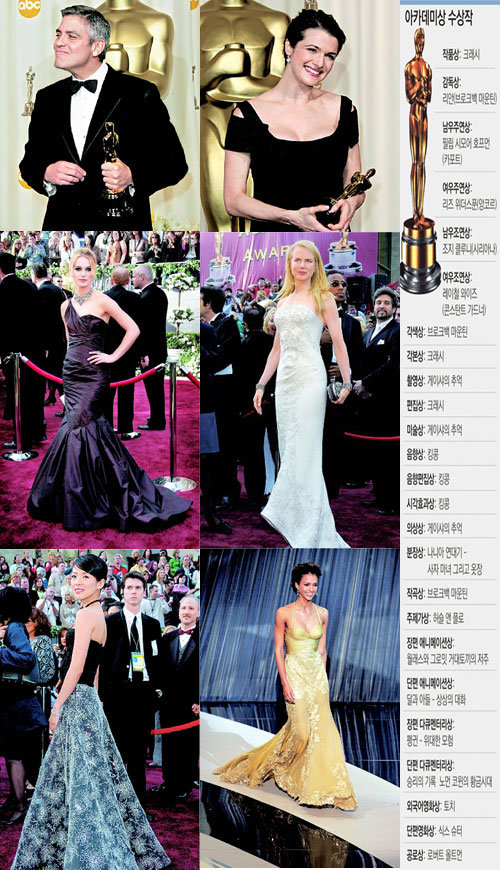Oscars for the Non-mainstream

It was victory for both the non-mainstream actor and movie. At the 78th Academy Awards, Crash (directed by Paul Haggis) received the Best Picture Award and Brokeback Mountain received the Achievement in Directing Award, movies that handled tabooed subjects in a piercing way. This years awards were expected to be swept by Brokeback Mountain, but the tables were turned on by Crash.
Crash is about racial discrimination that spells trauma for America. Experts lauded the movies fine detailing of societal conflicts happening in Los Angeles. Not only were there black and white wars, but the movie showed the misery of Hispanics and Arabs struggling with the American dream.
Despite the dirt cheap budget of $6.5 million, the independent movie failed the box office when it was released last August. But with the award show, DVD sales have risen with word-of-mouth praise, and some are forecasting that it will outdo Brokeback Mountain. Meanwhile, critics are saying that instead of the tabooed subject of homosexuality that conservative Americans abhor, the Academy opted for the much-rehashed topic of racial prejudice that Crash deals with.
Whatever the case, the important factor to focus on here is that the Academy chose very touchy political movies for the year 2006, all independent films unaffiliated with major studios. On top of that, they awarded Robert Altman (81), an independent film mogul, the honorary Oscar, making 2006 truly the year of indie movies.
Best male actor and female actress were also non-mainstream. Philip Seymour Hoffman won Best Male Actor, playing Truman Capote in the biographical film of Capote, who wrote Breakfast at Tiffanys and opposed capital punishment. It was the first main character for him, as well as the first Academy nomination and award. Reese Witherspoon received the Best Female Actress award for her role in Walk the Line, which will be released in Korea on March 9. Prior to the award, she was criticized for her lightheaded characters in Legally Blonde, but now she is recognized as a star with talent to boot.
Because such controversial pieces were chosen this year, the atmosphere was composed. Through the political jokes that the master of ceremonies and celebrities cracked, the problems of the American society were felt sorely.
The core of movies is storytelling, which is therefore, humanity. Through that, movies connect with people all over the world. Technology will change, but the heart of storytelling will remain the same. In New Orleans, six movies are currently being filmed. Six hundred residents have new jobs. This really shows how movies are contributing to restore the damage.(Academy president Sid Ganis)
Art is not only a mirror of society, but a hammer that sets it to right.(Best Screenplay award Bobby Moresco)
George Clooney, who received the Best Supporting Actor, starred in Syriana, a movie that dealt with the international warfare surrounding oil transactions, said, This group of people gave Hattie McDaniel an Oscar in 1939 when blacks were still sitting in the back of theaters. I am proud to be a member of this academy. Rachel Weisz, who received the Best Supporting Actress award for her role in Constant Gardener, mentioned those who died for justice, making the mood even more somber.
During the event, a special program aired that showed clips from movies such as All the Presidents Men, Waterfront, Erin Brockovich, Philadelphia, and Mr. Smith Goes to Washington, movies from classic to modern that dealt with the subject of injustice and those who fought against it.
Actresses on the red carpet dressed down this year as well, with many black gowns. Perhaps it was because of the 8-minute Inside Guide: What Nominees Should Know that the Academy board made with Tom Hanks that the thank yous were mercifully short. In the video, nominees were instructed to walk quickly to the stage, to hurry up with the hugging, to give a few words, and the stars followed suit admirably. Best Foreign-Language film went to Tsotsi, at which the South African winner said, Check out my thank yous on my website, drawing laughs from the crowd.
Mun-Myung Huh angelhuh@donga.com






![[이진영 칼럼]잘난 韓, 못난 尹, 이상한 張](https://dimg.donga.com/c/138/175/90/1/wps/NEWS/IMAGE/2026/01/20/133198367.1.jpg)
